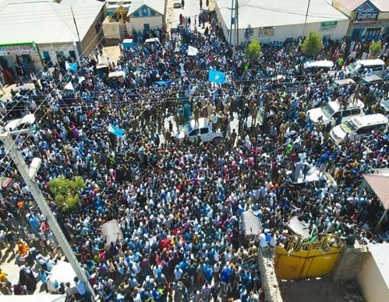By Prof. Abdinasir Ali Osman
The Genesis of Resilience: Forging Unity in the Crucible of Conflict
The narrative of Khatumo State is not a recent fabrication but a testament to the enduring aspirations of the people inhabiting the Sool, Sanaag, and Cayn (SSC) regions of northeastern Somalia. For fifteen years, these communities have navigated a complex and often violent landscape, their identity forged in resistance against the long-asserted control of neighboring Somaliland.
This protracted struggle, fueled by historical grievances, the neglect of local populations, and a deep-seated desire to remain unified within the Somali Republic, culminated in the emergence of the SSC-Khatumo movement. This was not merely a clan-based uprising, as some detractors have suggested, but a cohesive articulation of a distinct regional identity, rooted in a shared cultural heritage and a profound yearning for self-determination within a federal Somalia.
The “Blue Revolution” of 2023, marked by the decisive ousting of Somaliland forces from Las Anod, represented a pivotal moment, a hard-won victory that underscored the resilience and unity of the Khatumo people and set the stage for a new chapter in their long odyssey.
A Tentative Embrace: Federal Recognition and the Promise of Integration
The aftermath of the 2023 conflict witnessed a significant shift in Khatumo’s trajectory with the formal recognition of its interim administration by the Federal Government of Somalia (FGS) on October 19, 2023. This landmark decision, spearheaded by Prime Minister Hamza Abdi Barre’s administration, acknowledged the legitimacy of Khatumo’s struggle and its expressed desire to operate as a federal member state.
The invitation extended to Khatumo’s leader, H.E. Abdulkadir Aw-Ali (Firdhiye), for high-level talks in Mogadishu signaled a potential paradigm shift in the relationship between the central government and the historically marginalized SSC regions. This tentative embrace offered a beacon of hope for stability, development, and integration within the broader Somali political framework, seemingly aligning Khatumo’s aspirations with the FGS’s commitment to national unity.
Navigating Secessionist Shadows: Defiance and the Assertion of Federal Allegiance
However, Khatumo’s path towards federal integration remains fraught with challenges, most notably the unwavering opposition from Somaliland, which continues to vehemently claim the SSC regions as its own. Prime Minister Barre’s visit to Las Anod, the administrative capital of Khatumo, in April 2025, has become a focal point of this enduring tension. Somaliland’s hostile reaction and threats to prevent the visit underscore its determination to undermine Khatumo’s burgeoning relationship with Mogadishu.
In response, the SSC-Khatumo administration has adopted a defiant stance, asserting its control over its liberated territory and unequivocally welcoming the Prime Minister’s visit as a crucial step towards solidifying federal ties. This resolute posture highlights Khatumo’s commitment to its pro-union ideology and its willingness to stand firm against secessionist pressures, even in the face of potential threats.
A Region Rebuilding: The Imperative of Humanitarian Action and Sustainable Development
Beyond the political maneuvering and security concerns, Khatumo faces the immense task of rebuilding a region scarred by decades of marginalization and the recent conflict in Las Anod. The humanitarian crisis, marked by widespread displacement, loss of life, and the destruction of vital infrastructure, demands urgent and sustained attention.
While the FGS’s recognition offers a potential avenue for federal aid and development initiatives, the scale of the challenge necessitates a coordinated and robust response from both national and international actors. The key findings and recommendations outlined in recent assessments underscore the critical need for comprehensive housing and resettlement programs, economic recovery initiatives, the restoration of educational and healthcare facilities, and the establishment of food security. The interim administration, under H.E. Abdulkadir Aw-Ali (Firdhiye)’s leadership, bears the heavy responsibility of translating political gains into tangible improvements in the lives of its people, fostering a sense of unity and collective identity that transcends the scars of war.
The Future in the Balance: Integration, Autonomy, and the Quest for Lasting Peace
The future trajectory of Khatumo State remains delicately poised. Prime Minister Barre’s visit to Las Anod represents a pivotal moment, carrying the potential to either solidify federal integration and usher in an era of stability and development, or to further inflame regional tensions and prolong the cycle of conflict. Khatumo’s leaders face the complex task of balancing their aspirations for greater autonomy within the federal framework with the imperative of maintaining peace and security in a volatile region. The success of their state-building project will hinge on their ability to foster internal unity, navigate the intricate clan dynamics, secure sustained support from the FGS, and ultimately, find a peaceful and lasting resolution to the territorial dispute with Somaliland.
The international community, often hesitant to engage directly in Somalia’s complex regional dynamics, has a crucial role to play in providing humanitarian assistance, supporting peacebuilding initiatives, and advocating for a negotiated settlement that respects the will of the local populations and contributes to the overall stability of the Horn of Africa. Khatumo’s fifteen-year odyssey, marked by resilience, unity, and the unwavering hope for a brighter future within a united Somalia, stands as a compelling narrative in the ongoing quest for peace and self-determination in the region.
Prof. Abdinasir Ali Osman
Email: ipi2024@hotmail.com


Leave a Reply